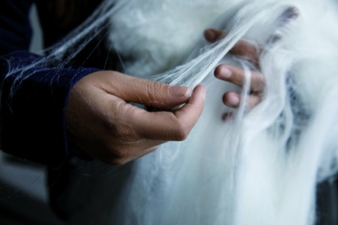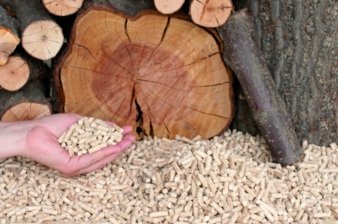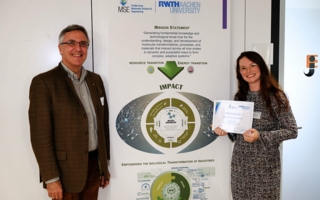22/06/2021 – Textile recycling — auf Deutsch lesen
Finland: new solutions to textile industry transformation
There is globally approx. 92 million tons of textile waste every year. New sustainable solutions are needed for each stage of a textile’s life cycle.

Spinnova is unique from the outset. The raw material used to create the fibre is the same pulp that's used for making paper. The wood comes from FSC and/or PEFC certified tree farms. Spinnova treat the pulp only mechanically, to create something called micro fibrillated cellulose; the feedstock for the spinning process. © Spinnova
Finland is known for its sustainable way of living as well as its innovation and design expertise. Finland’s central asset is the close cross-industry collaboration to constantly develop and innovate new solutions. Strong public-private cooperation results in commercially viable and impactful solutions for the global textile industry.
Recently, the textile industry has started to transform to more sustainable direction. Companies and customers are increasingly aware about climate change and societal issues, and environmentally friendly solutions are developed along the entire textile value chain. The need is to decrease the textile industry’s impact on climate and change the industry to more sustainable way as a whole. Finland is along in showing the way for solving this global challenge.
Finnish bio and circular solutions are already utilized globally
Finnish companies offer groundbreaking solutions at every level of the sustainable textile ecosystem: textile waste handling, treatment, B2B & B2C sales and usage, collection and recycling to identification and back to waste handling. Finnish companies aim to be in core of transforming the industry as a whole, including producing plastic free solutions for e-commerce packaging and therefore lowering the carbon dioxide emissions. Some examples of the innovations developed by Finnish companies include natural antimicrobial treatment of textiles, making fiber out of wood pulp and recycled textile fibers and a resale-as-a-service for clothes.
Wood-based fibers
Finland has a high know-how in wood-based fibers in textiles. The production of wood-based biomass requires much less water, chemicals and land than cotton. Numerous ongoing research projects for developing wood-based fibers for the use of the textile industry have already created solutions with commercial potential. Wood fiber is renewable and much better recyclable than traditional textile fibers. On top of all this, new textile regulations will come into force in the EU in 2025. Finland aims to start the process already by 2023. An example of these activities is the Nordics’ first large-scale end-of-life textile refinement plant that will open in Paimio this summer. Finland aims to be one of the five recycling hubs in Europe and constantly develops new textile waste innovations. Moreover, the possibilities are not limited to textile industry, but other value chains can benefit from these innovations, too. Car and shipbuilding industries are good examples.




